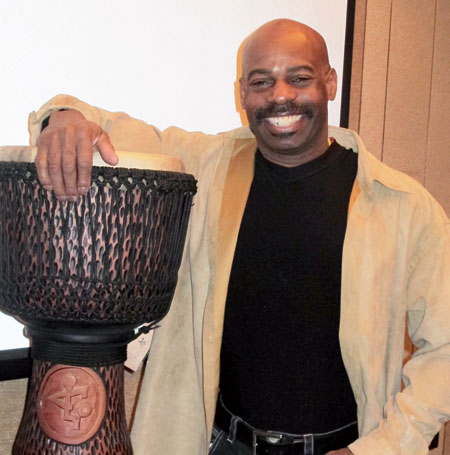

 |
|
Ron Powell says it is more important to learn why people play than how to play. Yang Yang / China Daily |
Ron Powell's love of the drums started when he was a 12-year-old listening to the radio at home in Philadelphia. It was the 1960s and a song by Santana came on, bursting with African drums.
Powell fell for the sound immediately and decided to make his own drum to duplicate it. Searching the house he found his "instrument" - a container his mother used to store sugar. So Powell dumped out the sugar and began to play, and he has never looked back.
Fortunately, he managed to get all the sugar back in the container before his mother found out, Powell recalls with a smile, sitting in a meeting room at the Marco Polo Parkside hotel in Beijing.
Powell was sent to China by US-based company Latin Percussion, the world's largest African drum maker, to work with musicians at Toning Beijing Culture & Development Co Ltd, teaching master classes and performing. Latin Percussion and Toning are business partners
On his final night in Beijing, Powell joined four other musicians to play African drums for the 18th anniversary of a female opera singers' club in China called Ladies' Spa.
Over six weeks, the American musician flew to Beijing twice for the program, which ended in the middle of January, when he had to head back to the US to perform with Diana Ross.
Powell began working as a professional musician immediately after high school, when his family moved to Los Angeles.
"Since I got out of high school, I looked in the city to see what bands were playing and who was famous and I wanted to play with them," he says.
"I went to them saying that I wanted to play in the band. Most of the time, they would say OK. Because I practiced a whole lot, I became very good soon."
Powell achieved his five-band high school dream, playing with Stevie Wonder among others.
"When you learn to play the drums, it's not just hitting on something," he says. "You have to learn about the culture and the people who play the drums. It's more important to learn why people play than how to play."
In the jungles of western Africa, and the rainforests of south and central Africa, he learned that people play drums for different reasons.
"Sometimes, it's just to make themselves feel good to dance; sometimes it's to pass down their culture; and sometimes it's for a wedding or funeral, or there are some religious reasons," he says.
For Powell, practice is more important than theory, and his college lessons were often interrupted by the opportunity to play. Every few months, a band would contact him to tour with them, with the trips lasting from three months to a year, he says. When the tour was finished, he would return to his studies of music at a Los Angeles university, which in the end took him 10 years to complete.
Powell took up the drums because it made him feel good, but later the challenge also drew him in further.
"Because percussion is the largest musical instrument family, there is endless learning. That's one thing that makes it difficult," he says.
"Then, it's very important to learn why the instrument is played. But the hardest thing to learn is the feeling of the music. It's very difficult to learn how to make the music feel the way it is supposed to because it cannot be taught. You can only learn the feeling from being with people who play it all the time. And that's not just for five minutes but for years."
Powell's time in China included trips to many cities, teaching people how to play the drums.
Tony Webb from the UK founded Latin Percussion 12 years ago and has worked musicians from all over the world including Australia, Japan, Germany, the US, the UK and China.
"We have the best musicians," he says. "Mark Armstrong is a music director at the Western Academy of Beijing. Dominic Bautista is the best key drummer and Ron is one of the top five drummers in the world."